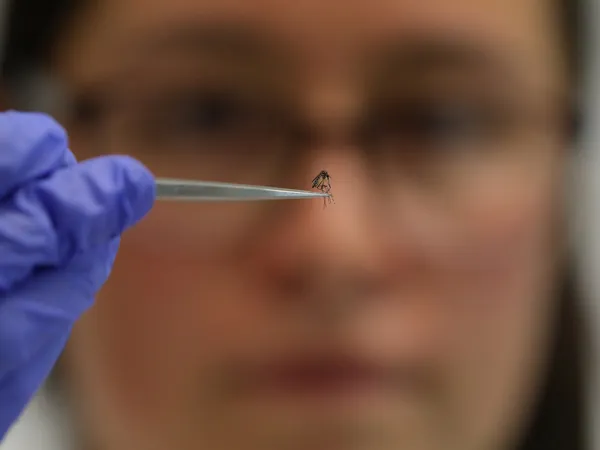
Could Mosquitoes Become Heroes in the Fight Against Malaria?
2024-12-21
Author: Sarah
Mosquitoes are typically known as carriers of devastating diseases, including malaria, dengue fever, and yellow fever. However, groundbreaking research conducted by scientists at Leiden University Medical Center (LUMC) and Radboud University in the Netherlands suggests these pests may take on a new role: as vaccine distributors.
A recent study revealed that researchers have successfully engineered mosquitoes to deliver vaccines that could provide enhanced immunity against malaria, one of the deadliest diseases affecting millions worldwide. According to the World Health Organization's most recent report, an alarming 597,000 lives were lost to malaria in 2023, with African nations bearing 95% of this tragic toll. Each year, over 240 million malaria cases are reported globally, with children and expectant mothers being the most susceptible.
How Does the Mosquito-Delivered Vaccine Function?
This innovative vaccine leverages a weakened strain of the malaria-causing parasite Plasmodium falciparum. "We have removed a critical gene from the malaria parasite, allowing it to infect individuals without causing illness," explained Meta Roestenberg, a leading vaccinologist at LUMC.
In a typical transmission, a mosquito bite injects saliva containing the malaria parasite directly into the bloodstream. The altered vaccine, however, aims to mimic natural infection while preventing disease development. "Because the gene is turned off, this parasite cannot mature in the liver or enter the bloodstream, thus preventing any symptoms," Roestenberg noted.
Clinical Trials: A Leap Forward in Vaccine Development
The researchers conducted a two-phase clinical trial. The initial phase involved an injectable vaccine derived from a genetically modified parasite, known as PfSPZ GA1, tested on 67 participants. This phase confirmed the vaccine's safety, although it only delayed malaria onset without fully preventing infection.
The second phase advanced the idea of mosquito-delivered vaccines, with participants receiving bites from mosquitoes harboring two forms of the vaccine: GA1 and the modified GA2. While GA1 allowed the parasite to replicate in the liver for 24 hours, GA2 extended this period, permitting a more robust immune response.
Results presented in the New England Journal of Medicine showed promising outcomes: 13% of the GA1 group and an impressive 89% of those in the GA2 group developed immunity against malaria. Notably, none in the placebo group exhibited immune response.
The Need for More Extensive Research
Despite these encouraging findings, the small sample size—just 20 participants—indicates that further studies are essential. Researchers are keen to investigate the long-term immune responses provided by the GA2 vaccine, as well as its effectiveness against various malaria strains prevalent in endemic regions.
Although utilizing mosquitoes as a vector is a speedy method to deliver malaria-spreading sporozoites, Roestenberg cautioned against the practical application of this method beyond clinical trials. "This approach is not sustainable for mass immunization; we aim to develop a vialled vaccine for broader implementation in Africa."
Global Perspectives on Insect-Delivered Vaccines
The concept of using insects to deliver vaccines is not new. In Japan, scientists modified mosquitoes in 2010 to carry a vaccine for leishmaniasis, demonstrating that rodents bitten by these mosquitoes developed antibodies. While this suggested potential, the efficacy of the immune response needed further exploration.
In the United States, a 2022 study involving participants in Seattle also tested insect-delivered vaccines. Similar to the Dutch research, genetically modified mosquitoes were used as carriers for weakened malaria parasites. The results indicated that the mosquito-delivered vaccine had a 50% effectiveness, underscoring the potential promise of this unconventional method.
Conclusion: A New Hope in the Battle Against Malaria?
While the use of mosquitoes in vaccine delivery opens exciting possibilities in the fight against malaria, rigorous testing and research are paramount before any large-scale implementation can be considered. The dream of eradicating malaria may not be far-fetched; with continued innovation and determination, the humble mosquito might just play a heroic part in this crucial battle.



 Brasil (PT)
Brasil (PT)
 Canada (EN)
Canada (EN)
 Chile (ES)
Chile (ES)
 España (ES)
España (ES)
 France (FR)
France (FR)
 Hong Kong (EN)
Hong Kong (EN)
 Italia (IT)
Italia (IT)
 日本 (JA)
日本 (JA)
 Magyarország (HU)
Magyarország (HU)
 Norge (NO)
Norge (NO)
 Polska (PL)
Polska (PL)
 Schweiz (DE)
Schweiz (DE)
 Singapore (EN)
Singapore (EN)
 Sverige (SV)
Sverige (SV)
 Suomi (FI)
Suomi (FI)
 Türkiye (TR)
Türkiye (TR)